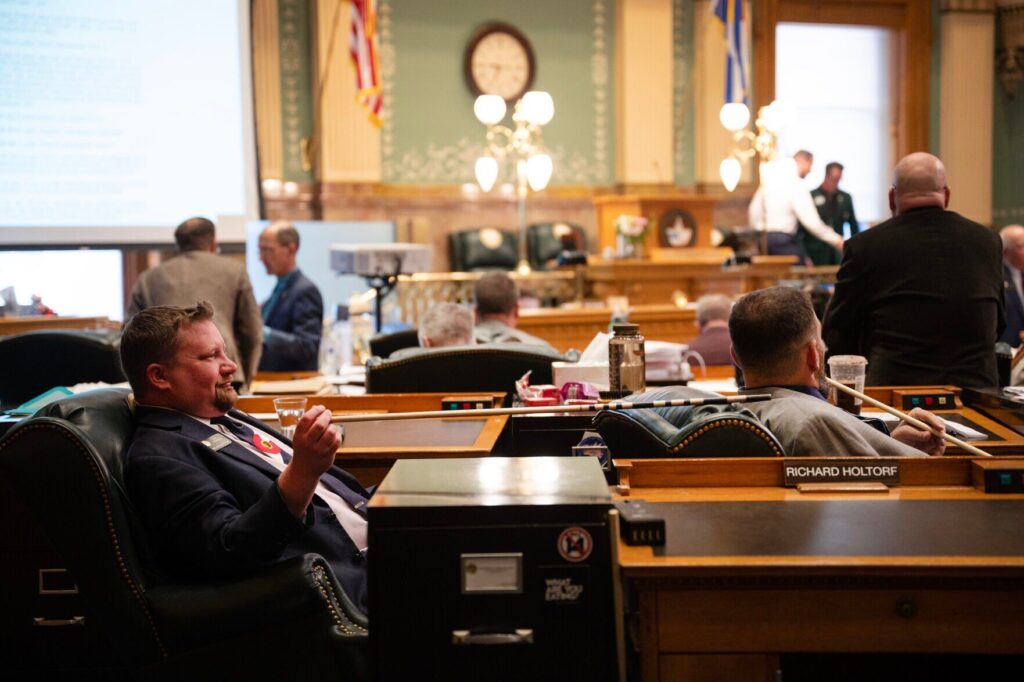Senate committee gives green (well, maybe yellow) light to artificial intelligence bill

Christian Murdock/The Gazette
The Senate Appropriations Committee on Sunday handed Senate Bill 4, the artificial intelligence bill sponsored by Senate Majority Leader Robert Rodriguez, a 4-3 win and moved it on to the full Senate.
Whether the measure has the votes to get out of the Senate is another matter entirely.
Much of the discussion was around the bill’s cost. As introduced, it was estimated at $4.4 million, largely expenses for the governor’s Office of Information Technology, which handles IT issues for most state departments, and the judicial department.
Rodriguez had pushed for an amendment when the bill was in the Senate Business Affairs and Labor Committee, to shift some of the bill’s disclosure requirements for public entities to open records requests. He told the appropriations committee he hoped that would reduce the cost.
Instead, it increased it, by $400,000, and resulted in costs for the departments of labor and personnel.
Sen. Barbara Kirkmeyer, R-Brighton, argued against the fiscal note, stating that it was not done properly and blaming the governor’s staff for the errors.
The due diligence was not done, she said. These kinds of costs are not usually funded only by general fund dollars, which is what the fiscal note currently says the money would come from.
When these are centrally appropriated costs, meaning costs paid for by multiple agencies to another agency, they also look at the potential to use cash or federal funds, Kirkmeyer explained. She tried to get the committee to reject the fiscal amendment, which would have meant the bill went to the full Senate without the money to pay for the costs.
The cost for Senate Bill 4 are likely to be even higher in future years, Kirkmeyer said.
But Sen. Judy Amabile, D-Boulder, the committee’s chair, said it would be irresponsible to send the bill to the Senate without an appropriation.
Kirkmeyer also reminded the committee that the fiscal note for Senate Bill 24-205, the law signed by Gov. Jared Polis in May 2024, was also wrong. It said the law could be implemented with existing resources and would not need any additional appropriations.
SB 24-205 put into place the nation’s first regulations on artificial intelligence as it pertains to discrimination in a number of areas, including employment, health care, education, and banking and finance. It has an implementation date of Feb. 1, 2026.
This week’s special session was intended to fix concerns raised by Polis, the attorney general and the tech industry. Without those changes, the governor’s office has asked for, at a minimum, a delay in the implementation date.
The appropriations committee approved an amendment from Rodriguez to shift the implementation date to May.
The hearing took place Sunday after four days of delays.
The appropriations hearing on SB 4 was originally scheduled for Thursday but negotiations — and reluctance by Amabile to hold the hearing when no deal appeared to be forthcoming — has meant the bill has languished on the Senate calendar.
On Saturday, Rodriguez changed the committee’s makeup to make it more friendly to his bill, and that paid off Sunday. He took off the chair of the Joint Budget Committee, Sen. Jeff Bridges of Greenwood Village, and one Republican, Sen. Larry Liston of Colorado Springs. He added Sens. Mike Weissman, D-Aurora and Katie Wallace, D-Longmont. Both voted for the fiscal amendment and the bill.
But the final vote was a narrow: 4-3, with Amabile voting “no” with the committee’s two remaining Republicans.
“I don’t want to do something to cause our educational institutions to spend that money, and I don’t want to do this until we have a deal and we don’t have a deal,” Amabile said at the hearing’s conclusion.
More amendments are expected when the bill goes to the full Senate, which is likely later today. Deals that have been discussed since Thursday include allowing a portion of the 2024 law, such as its disclosure and liability language, to go forward and work on issues around developer responsibility. Another conversation within the tech industry is whether to allow the 2024 law to go into effect instead of Rodriguez’ bill, which the tech industry views as much worse than the 2024 law. That’s largely because of expanded definitions on algorithmic systems, which one coalition said would include far more than just artificial intelligence.
That may be the path forward if Rodriguez’ bill, and another awaiting action from the House, both fail to make it to the governor’s desk.
The other artificial intelligence bill, House Bill 8, which as amended would be only a delay on the implementation date for SB 205, is still awaiting House debate, which has been on hold while SB 4 is being negotiated.













